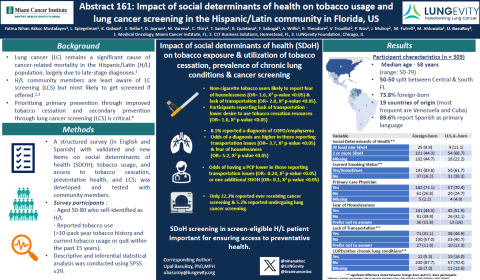Read time: 2 minutes.
Lung cancer continues to be the leading cause of cancer-related deaths in the Hispanic/Latinx community, largely due to delayed diagnoses. Early detection through lung cancer screening (LCS) and tobacco cessation could dramatically reduce this burden. Project ASCENT, a collaboration between Baptist Health South Florida’s Miami Cancer Institute and LUNGevity Foundation, is working to close this critical gap by tailoring screening and prevention programs for South Florida’s Hispanic/Latinx population.
Many individuals in this community face barriers to accessing preventive care. “The data clearly show that structural inequities contribute to these disparities,” says Upal Basu Roy, PhD, MPH, Executive Director of Research at LUNGevity. “If we want to save lives, we must first address the social factors that prevent people from seeking care.”
Project ASCENT’s quantitative research sheds light on these barriers. Through surveys conducted in English and Spanish, researchers found that nearly 80% of participants were current tobacco users, and fewer than 6% had ever undergone lung cancer screening. Social determinants of health (SDOH) such as transportation issues, financial insecurity, and fear of houselessness were strongly linked to both higher tobacco use and lower access to screening.
These findings, presented at the ASCO Quality Care Symposium 2025, provide the first data-driven look at how social determinants of health affect lung cancer-related behaviors in the Hispanic/Latine community.
“Our study demonstrates that challenges like housing instability or lack of transportation do not exist in isolation; they directly impact lung health outcomes,” explains Dr. Basu Roy. “Screening programs that ignore these realities will struggle to reach those who need them most.”
This research suggests that social determinants of health screening should be a key component in healthcare discussions. It also paves the way for future interventions focused on healthcare professionals.
By identifying and addressing the root causes of health inequity, Project ASCENT is laying the groundwork for more effective, inclusive lung cancer interventions. “This research is not just about data,” Dr. Basu Roy emphasizes. “It’s about ensuring that no one is left behind in the fight against lung cancer.”


